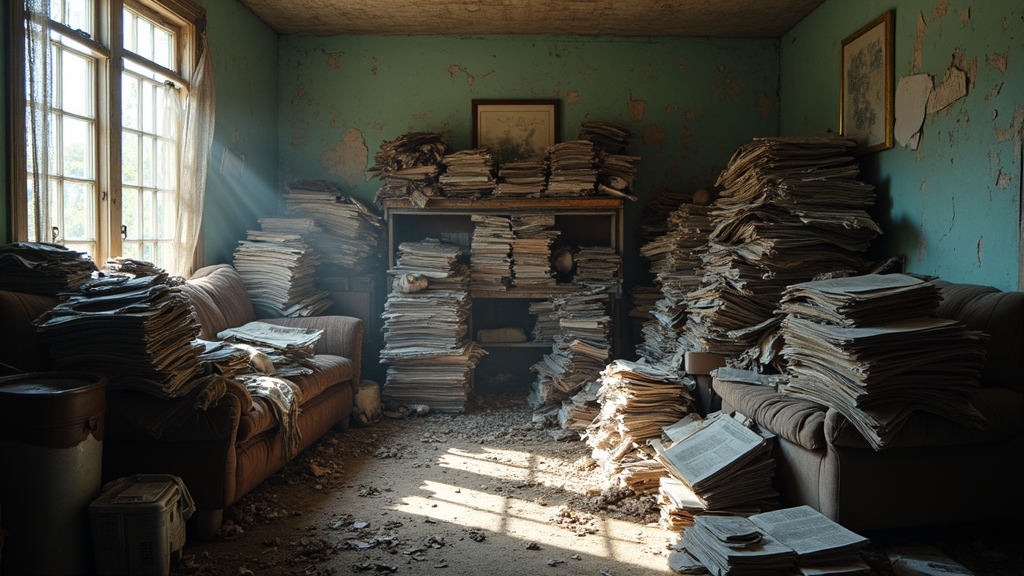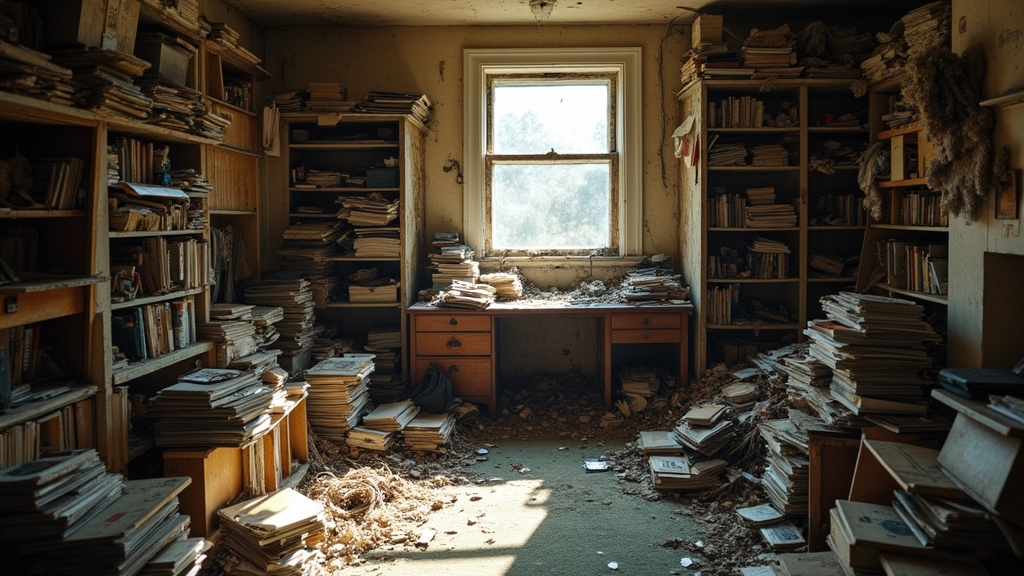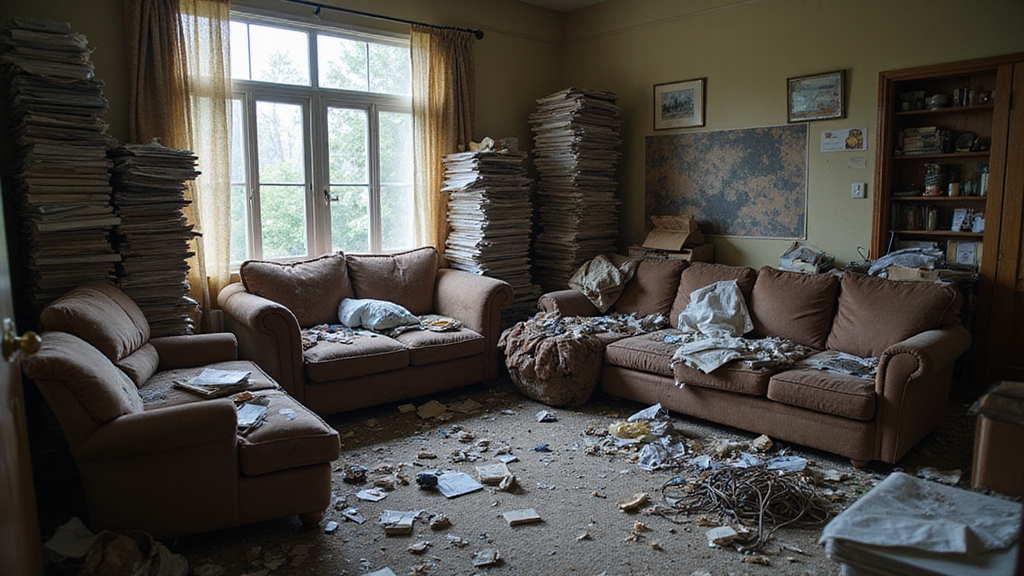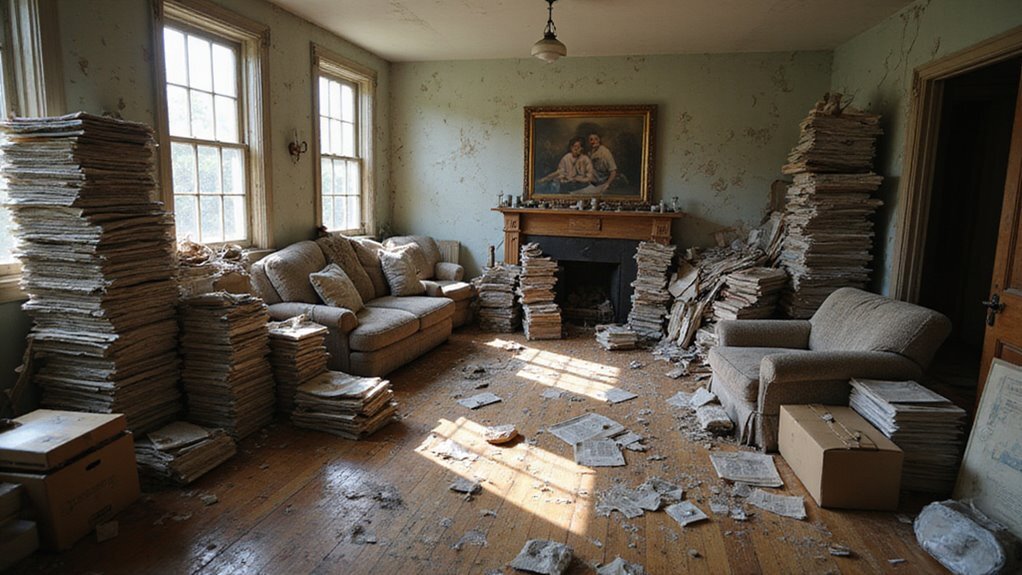Hoarding is a serious problem that can quickly lower a home’s value. Many buyers hesitate to consider properties with extreme clutter. Homeowners and investors must understand how hoarding affects the real estate market.
Hoarded homes often hide deeper issues like mold, pests, or damage. These problems make repairs costlier and scare off potential buyers. The mess can also lead to higher insurance premiums and even legal trouble. Hoarding can lower property value by 5-10% compared to similar homes.
The good news is that you can take steps to fix this issue. If you address the clutter and repair any damage, you can recover much of your home’s value. This blog will guide you through solving hoarding-related property value problems step by step.
Key Takeaways
- Hoarding reduces property value by 5–15% due to poor presentation, hidden damage, and decreased buyer interest.
- Visible clutter makes homes harder to sell, leading to longer market times and lower offers from buyers.
- Hoarding can conceal structural issues, mold, or pests, further decreasing value and complicating inspections.
- Safety hazards and code violations from hoarding increase legal risks, fines, and further reduce market value.
- Homes affected by hoarding may face higher insurance premiums, denied claims, or policy cancellations, impacting saleability and value.
Understanding Hoarding and Its Causes

Hoarding is more than just having a messy home. It is a complicated mental health issue that affects people and property values. If ignored, it can lead to serious problems for homeowners and buyers.
Many people hoard because of anxiety, past trauma, or family history. Psychological reasons often cause people to collect and keep things they do not need. If untreated, this disorder can make it hard to organize a living space.
Hoarding often stems from anxiety, trauma, or family history, making it difficult to keep a living space organized without help.
Cultural beliefs and media also encourage people to keep more items. These influences can make it harder for someone to let go of things. If society values owning many items, hoarding may become more common.
Homes with hoarding issues usually lose value in the property market. Buyers may avoid these homes due to cleanup costs and neglect. Recognizing the benefits of selling to a cash buyer can be a practical solution for distressed properties.
Additionally, understanding market conditions and timing can help in deciding the best course of action. If you understand these causes, you can make better choices in real estate and asset management.
Common Signs of Hoarding in Homes
Recognizing signs of hoarding is important when judging a home’s value. Hoarding can lower a property’s worth and create extra costs. If you notice these signs, the home may need repairs and cleaning.
Hoarding is more than just surface mess. Blocked exits or hallways can show safety issues and lower the value. Stacks of newspapers or magazines mean a higher fire risk.
Some homes have rooms you can’t enter because of clutter. Inaccessible rooms reduce the usable space. Excessive garbage can create health risks and scare buyers away.
Strong odors from trash or animals mean expensive cleaning is likely. These smells can turn buyers away quickly. If you spot any of these signs, expect a lower selling price.
Early detection helps buyers, sellers, and agents make better choices. If hoarding is present, extra costs and buyer hesitation are likely. Understanding home safety issues related to hoarding can help in making informed decisions.
Additionally, market conditions often influence the urgency of transactions, especially when properties require extensive repairs due to hoarding.
Impact on Curb Appeal and First Impressions

Visible signs of hoarding can hurt a home’s curb appeal and first impressions. Buyers often judge a property from the street before entering. If the outside looks messy, they may think the home is not well cared for.
Homes with cluttered exteriors or too many items can sell for 5-15% less than tidy ones. Poor curb appeal can also make buyers lose confidence. Fewer interested buyers can mean the home stays on the market longer.
If owners improve curb appeal, they can attract more buyers and better offers. Simple changes like cleared pathways and neat lawns help a lot. Good storage and organization show the property is well maintained. Additionally, addressing issues like termite damage can prevent further deterioration and make the property more appealing. Utilizing public records to identify recent sales can help target potential cash buyers interested in quick transactions.
Structural Damage Hidden by Clutter
When clutter masks key areas of a property, you can’t accurately assess risks like concealed water damage or hidden pest infestations. Market data shows that unresolved issues often lead to delayed maintenance, which drives down property value and complicates transactions. If you’re evaluating a hoarded home, factor in the likelihood of structural problems that aren’t immediately visible. Proper property presentation can help identify and address these hidden concerns before they impact saleability.
Concealed Water Damage Risks
Clutter can hide water damage in your home. Hidden leaks and moisture weaken the structure and lower the home’s value. If these problems go unnoticed, repairs can become expensive.
Homes with untreated water damage often sell for much less. Mold, rot, and foundation issues can grow under piles of belongings. Buyers may avoid homes with suspected hidden damage.
If you manage clutter, you can spot leaks early and prevent bigger problems. Neglecting clutter may increase stress and anxiety. Simple steps can help protect your investment and your well-being.
Hidden Pest Infestations
Clutter in a home gives pests like termites, rodents, and insects places to hide. These hidden infestations are hard to find and fix. If clutter is left unchecked, pests can damage the property and lower its value.
Pest problems often go unnoticed until a home inspection or sale. This can lead to expensive repairs and scare away buyers. Unseen pest damage may also lower appraisal values.
The table below shows some common risks and their impact on the market:
| Risk Factor | Market Impact |
|---|---|
| Termite damage | Lower appraisal values |
| Rodent nesting | Expensive remediation |
| Insect infestations | Buyer hesitation |
| Delayed pest detection | Failed inspections |
| Hidden structural issues | Reduced buyer confidence |
Buyers and investors look carefully for pest problems. High remediation costs can make them walk away from a deal. If you deal with clutter early, you can protect your property’s value and avoid hidden pest concerns.
Delayed Maintenance Issues
Hidden structural issues often go unnoticed in cluttered homes. Clutter can hide water leaks, cracks, or mold. If you cannot see these problems, you may delay fixing them.
Industry data shows clutter can lower property value by 20%. Buyers may worry about hidden damage if they see too many belongings. Homes with major repair needs usually stay on the market longer.
If you remove clutter early, you can spot problems sooner. Early repairs will save money and protect your investment. Clearing space can also help make your home more appealing to buyers.
Increased Risk of Mold and Pest Infestation
Excessive clutter in a property raises the risk of mold and pest infestations. Poor airflow and trapped moisture allow mold to grow. Clutter also attracts pests like insects and rodents. Regular cleaning and organization can help prevent these issues from escalating. Proper maintenance practices are essential for protecting your property’s value. Visible mold or pests can lower a home’s value by up to 20%.
Buyers often avoid properties with these issues. If you want to protect your investment, you must keep your property clean. Piles of newspapers may block vents and cause hidden mold. Food wrappers in corners can attract unwanted pests. Overfilled closets with little ventilation may hide moisture problems. Stagnant air behind large furniture can help pests multiply. If you use proper storage, you can reduce these risks. Simple decluttering steps help protect your home’s value. Additionally, addressing underlying issues like title problems ensures a smooth sale process and maintains the property’s worth.
Fire Hazards and Safety Concerns

You can’t ignore how hoarding sharply increases the risk of fire spread, with clutter acting as fuel and accelerating damage. Blocked emergency exits further compromise safety, making properties less attractive to buyers and insurers. Market data shows that homes with these hazards often face reduced valuations and higher insurance premiums.
Additionally, the presence of clutter can hinder quick access for emergency responders, further endangering residents and complicating fire safety measures. The clutter also hampers effective property inspections, which are critical in assessing safety compliance and insurance eligibility.
Increased Fire Spread Risk
Hoarding increases the risk of fire spreading quickly in a home. Extra clutter adds more items that can easily catch fire. Obstructed pathways make it harder for firefighters to respond.
Insurance companies may charge higher premiums for cluttered homes. Property values often drop when there is a high fire risk. Homeowners could also face legal problems if safety rules are not followed.
According to the National Fire Protection Association, clutter raises the fire load in a house. Effective fire prevention and clutter control help keep property values steady. If you do not manage hoarding, you could lose more than just personal items.
Stacks of paper or clothes can catch fire and burn fast. Narrow hallways let flames move quickly from room to room. Large piles of belongings trap heat and make fires more intense.
Hidden electrical problems may spark and light clutter instantly. If exits are blocked, it becomes harder to escape during an emergency. Keeping pathways clear is important for everyone’s safety.
Blocked Emergency Exits
Blocked emergency exits create serious safety risks. These risks lower property value and make insurance harder to get. Emergency exits should always be clear for safety.
Data from the National Fire Protection Association shows blocked exits cause many fire deaths in homes. If exits are blocked, people and first responders take longer to get out or help. This delay increases the danger during emergencies.
Insurance companies check for clear exits during inspections. If exits are blocked, you may pay higher premiums or lose coverage. Buyers see blocked exits as a big problem and may avoid buying.
If you keep emergency exits clear, you protect your investment and make your property safer.
Difficulty in Conducting Property Inspections
Hoarding makes property inspections hard and slow. Inspectors cannot easily check the home’s condition due to blocked areas. This may cause hidden problems to go unnoticed and affect the property’s value. Proper appraisal requires clear access to assess inherited property accurately. If clutter blocks paths, inspectors have trouble reaching important rooms.
Some systems and appliances stay hidden behind piles, so they cannot be checked. Floors and walls may be covered, which hides damage or pests. Utilities may be blocked, so safety checks are not possible. Incomplete inspections lower trust for buyers. If clutter is not managed, inspectors spend more time and cannot give full reports. Addressing home size and usable space issues can improve inspection quality and property valuation.
Challenges for Real Estate Agents and Appraisers
Minor hoarding can make it hard for agents and appraisers to do their jobs. Clutter blocks access and hides a home’s features. If rooms cannot be measured or repairs estimated, property value may be set incorrectly. Additionally, hoarding can lead to commingling of assets, which complicates property assessments and ownership issues. Homes with clutter usually stay on the market longer.
Buyers may offer less because clutter makes them worry about hidden problems. If clutter is present, professional cleaners might be needed, adding expense. Talking about clutter with sellers can be difficult, especially if mental health is involved. These conversations might slow down the process or cause stress for all parties. Hoarding can reduce marketing success and delay sales.
Lowering of Comparable Market Value
When you list a property affected by hoarding, you’ll notice reduced buyer appeal and fewer competitive offers, which can drag down the neighborhood’s overall market data. Appraisers often factor in these conditions, leading to lower valuations compared to similar, well-maintained homes.
As a result, you risk seeing a direct negative impact on comparable market value throughout the area. Additionally, homes in poor condition may require repairs or renovations, which can further decrease their value and deter potential buyers.
Reduced Buyer Appeal
Visible hoarding lowers a property’s marketability. Buyers often lose interest when they see too much clutter. Homes with visible hoarding usually stay on the market longer and sell for less.
Cluttered hallways can make it hard to walk through the home. Overfilled closets may suggest there is not enough storage. Buyers might think the space is smaller than it really is.
If kitchens and bathrooms are packed with items, buyers may worry about poor upkeep. These problems can lead to lower offers. Sellers lose their advantage in the market if hoarding is visible.
Negative Appraisal Impact
Visible hoarding lowers your home’s appraisal. Appraisers compare your home to others recently sold nearby. Excessive clutter makes rooms look smaller, blocks access, and can hide damage.
These issues make your home less similar to clean, well-kept houses. If clutter is present, appraisers may reduce your property’s value. Neglected homes with hoarding can be valued up to 15% less than comparable properties.
Investing in organizing or storage solutions can increase your home’s value. Clean and organized spaces help your home appraise higher. Simple improvements can make your property more appealing in today’s market.
Longer Time on the Market
Homes affected by hoarding usually stay on the market much longer than others. Buyers want clean and tidy spaces that are easy to move into. A cluttered house can make it hard for buyers to see its true value.
Buyers may walk away if rooms are full and the layout is hard to see. Blocked hallways and entryways make the home feel smaller and less inviting. Kitchens and bathrooms filled with personal items can suggest the home has not been cared for.
If storage options are not clear, buyers might think the house is hard to organize. These issues can slow down the sale. Offers may also be lower than expected if the home appears cluttered.
Legal and Insurance Implications
You’ll face heightened legal and insurance risks when hoarding leads to code violations, which can result in costly fines and orders for remediation. Insurers may deny coverage or raise premiums due to increased fire hazards and structural concerns, impacting your property’s marketability. Data shows that unresolved liability risks often deter buyers and depress sale prices.
Code Violations and Fines
When a property has hoarding issues, local governments may issue code violations. These violations are for health, fire, and building safety risks. If left unchecked, they often lead to large fines.
Unresolved code violations can make your property less valuable. Data shows property values can drop by up to 30%. Buyers and lenders may avoid properties with ongoing violations.
Overflowing hallways can block emergency exits and cause fire code fines. Accumulated trash brings pests, leading to health penalties. Overloaded floors and blocked vents may also cause costly repairs and environmental citations.
If you address clutter and use proper storage, you can reduce the risk of violations. Regular cleaning and maintenance help keep your property safe. Taking action early can protect your investment’s value.
Insurance Coverage Challenges
Unresolved hoarding problems make it hard to get proper insurance coverage. Insurance companies see clutter as a serious risk. They may deny coverage or charge much higher premiums.
Claims for fire, water damage, or mold are often rejected if a home has too much clutter. Inspections can reveal hoarding, which may lead to policy cancellation. Insurers also connect property risks to mental health issues.
If you want full insurance coverage, you must address hoarding. Professional help and proof of clean-up are often required. Showing effort to fix problems can help you keep your policy.
Liability Risk Increase
Hoarding increases the risk of accidents and injuries on your property. This raises both your legal and financial liabilities. If someone is hurt because of clutter or hazardous waste, you could face lawsuits.
Insurance companies often deny claims for homes with hoarding issues. Some may even cancel your coverage if safety rules are not followed. Properties with severe hoarding have claim denials up to 30% higher than average.
Hazardous waste and unstable structures can lead to legal trouble and fines. You might have to pay for lawsuits or regulatory penalties. Environmental fines are possible if waste is not stored safely.
If exits are blocked or debris falls, injuries are more likely. Flammable materials increase fire risks. Structural problems can cause serious collapses.
These dangers lower your property’s value and make it less attractive to buyers. Buyers may also worry about hidden problems. If you want to sell, you could lose money.
Effects on Neighboring Properties
Hoarding affects not just the home but also nearby properties. If a house is hoarded, neighbors may see lower property values. The area may also appear less welcoming to buyers.
Potential buyers often avoid neighborhoods with poorly maintained homes. They prefer areas where homes are tidy and well-kept. This perception can reduce your home’s value by 5-10%.
Homes next to hoarded properties usually stay on the market longer. They receive less buyer interest and often sell for less money. If you live nearby, your home may be harder to sell.
If neighbors use good storage and decluttering methods, they can improve the area’s appearance. These efforts may help limit the negative impact. Regular upkeep benefits everyone in the neighborhood.
Costs of Cleanup and Remediation
Severe hoarding can cause cleanup and repair costs to rise fast. These costs usually range from $5,000 to over $25,000. Cleanup costs can lower the property’s value and make it harder to sell.
Buyers often offer less when cleanup is needed. Lenders may not want to finance homes with these problems. These extra costs can make a property a risky investment.
Costs come from several sources. These include removing piles of junk and cleaning up biohazards like mold or pests. Repairs to damaged floors or walls also add to expenses.
Hazardous material disposal usually has extra fees. If you understand these costs, you can better judge the impact on your investment. Careful planning is needed before buying a hoarded property.
Strategies for Restoring Property Value After Hoarding
Restoring property value after hoarding means making smart changes that buyers want. If you use modern storage solutions, buyers will see the space as organized and useful. Built-in shelves or closet systems often increase the home’s value.
Staging each room helps buyers notice open layouts and larger spaces. According to the National Association of Realtors, organized homes sell faster and for higher prices. Homes with good organization spend less time on the market.
Repairs are also important if you want to boost value. Fresh paint, new floors, and updated fixtures make a big difference. These changes help your home compete in the current real estate market.
Conclusion
If a property has hoarding issues, its value can drop quickly. Hoarding creates safety concerns and makes homes less attractive to buyers. If owners act early, they can limit the negative impact on their investment.
If you need to sell a hoarded home, Limitless Homes of KC can help. We buy houses for cash in any condition, including those affected by hoarding. If you want to avoid costly repairs or cleanup, selling directly is a good option.
If you are ready to move forward, we are here for you. Contact Limitless Homes of KC today to get a fast, fair cash offer. Let us help you protect your property’s value and move on with peace of mind.

